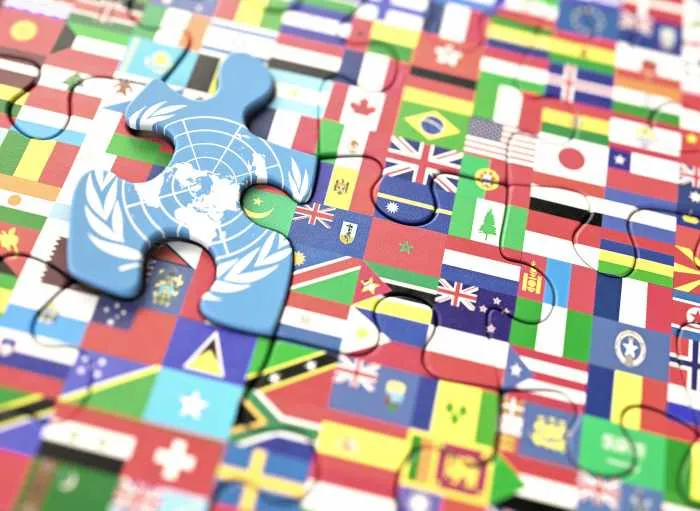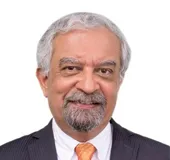-
CENTRES
Progammes & Centres
Location
The UN member states need to go beyond their narrow national outlook and allow globally agreed principles and values to go hand in hand with their national strategic interests.

It has been nearly five months since Russia invaded Ukraine on 24 February 2022. Unfortunately, however, the war seems far from over and is likely to be protracted over months, if not years. This new war in Europe, which was unthinkable even in early 2022, has placed both the post-World War II global order and the United Nations (UN) Charter in serious jeopardy. It is now extremely crucial for all UN member states to ensure that idealism and realism both prevail in their positions and policy responses to the Ukrainian Crisis.
The UN Charter, an inspirational and aspirational document crafted over 75 years ago was born out of the ashes of a brutal war to prevent future wars in Europe and the world. There are many examples of UN “idealism” working and getting political traction. One groundbreaking example is the 1948 Universal Declaration of Human Rights, the most translated document ever, whose many codified instruments have significantly contributed to what is now referred to as the international rule of law. Another more recent example is the 2015 adoption of the 2030 Agenda, embodying the Sustainable Development Goals. These were agreed upon by the consensus of all 193 UN Member States in 2015 and represent the most ambitious development agenda ever agreed upon in history.
One groundbreaking example is the 1948 Universal Declaration of Human Rights, the most translated document ever, whose many codified instruments have significantly contributed to what is now referred to as the international rule of law.
In the context of the Ukraine war, it will not just be an act of idealism, but it is also in the national medium and long-term strategic interest of most countries, including important developing countries such as India, Turkey, South Africa, Brazil, and the People’s Republic of China, to uphold the ideals, principles, and values of the UN Charter that has protected them since 1945. It is now imperative that they deliver on this not just in diplomatic words but through their deeds and actions.
Such an approach is not naiveté. It recognises at the outset that no country can live on idealism alone and that strategic national interests are always a part of any calculation or decision made. Nevertheless, a healthy dose of idealism is also necessary when there has been such a stark and brazen violation of both the UN Charter and international rule of law, almost unprecedented since the creation of the United Nations. This was overwhelmingly agreed upon by the UN member states recently through at least two UN General Assembly Resolutions. Indeed, it is a pivotal moment where all 193 UN member states, and certainly all existing and aspiring permanent and non-permanent members of the UN Security Council, must be both in consensus and on the right side of history on this unprovoked war. Their priority in this crucial moment must be to honour their commitment to protecting global peace and security, going beyond their narrow national interests.
This should not be viewed as a choice between the West and Russia but as standing up for both the UN Charter and international rule of law which all UN Member States have endorsed and pledged to uphold.
The marrying of idealism and realism does not imply placing a higher priority on Europe or the North Atlantic Treaty Organisation’s (NATO) problems and needs above those of other UN member states. The war in Ukraine is not just Europe’s or NATO’s problem; it threatens the future of the liberal democratic world order which has, on balance, worked well for all countries, especially for developing countries over three-quarters of a century.
Putin should also be stopped because his ambitions are much greater than limiting NATO enlargement. His words and deeds have repeatedly shown that his ambitions are to regain a long-lost Russian empire and these ambitions arguably remain largely unchanged despite significant military losses and setbacks in Kyiv.
Indeed, the fear of NATO’s enlargement to include Ukraine could not have been the most important concern that Putin had. The French and German opposition to Ukraine joining NATO in 2008 despite US support would have made it clear that Ukraine could never join NATO. Even President Zelensky has recently accepted this in public. In hindsight, it is likely that if Ukraine had been allowed membership in NATO in 2008, then this invasion and war would never have happened.
The West, especially the United States (US) and Germany, are culpable in many other ways and the European Union (EU) and the US must bear collective responsibility for giving Putin the benefit of the doubt on too many occasions over much of the last decade despite multiple international red lines crossed by him in Syria, Crimea, and elsewhere. The lack of a meaningful western response, even silence at times, in all these cases, is what emboldened him to launch this unprovoked war. This was reinforced when Germany awarded the Nord Stream 2 natural gas pipeline to Russia in 2016 soon after it annexed Crimea in 2014, indicating that Europe’s most significant economic power was willing to partner with Russia despite its violation of international laws. Collectively, these and other episodes created the ground for Russia’s invasion of Ukraine in February 2022.
For many developing countries dependent on Russia thus far for military sales or oil and gas, such reconciliation must be accompanied by much greater access to western or other sources of military technology and oil and gas.
But all these misguided decisions, serious and unforgivable as they may be, do not justify committing another wrong in the case of Russia’s Ukraine war, even if in the name of neutrality or non-alignment.
National interests should not be narrowly situated in the past or short-term future, but viewed broadly and strategically, in terms of the medium and longer-term. In this time frame, it is almost certain that Putin’s Russia will emerge weaker geopolitically, militarily, and economically as a result of his unjust war, and Russia is likely to be unable to continue to play significant support roles in any of these areas that it has played in the past. Moreover, as a result of its weakened status, it is likely to be under the much greater future influence of China, having to do its bidding. This cannot be in the national interest of most countries, certainly not India or the Quad, of which it is an integral part.
Accepting this argument does not mean that we overlook the multiple transgressions of the US, United Kingdom and some other western countries through their initiation and conduct of illegal wars and occupations over many decades. But comparisons of Ukraine with Iraq or Afghanistan are misleading and inaccurate, for a variety of reasons, however misguided and doomed to failure these western interventions were from their inception. In Afghanistan, for example, the Taliban has once again shown why they are unfit to govern in the 21st century, most recently by their treatment of girls and women.
Strategic global and national interests can be reconciled. For many developing countries dependent on Russia thus far for military sales or oil and gas, such reconciliation must be accompanied by much greater access to western or other sources of military technology and oil and gas. The US, EU, and NATO must ensure that this will happen in a short time frame. This will probably require several overdue measures, including lifting the US’ restriction on exports of high-tech military equipment to certain developing countries whom it is urging to take a clear stand against Russia’s invasion. It also requires the EU to quickly implement its oil and natural gas embargo on Russia so that it does not give other countries a reason for increasing or not reducing their purchase of discounted Russian oil and natural gas.
The views expressed above belong to the author(s). ORF research and analyses now available on Telegram! Click here to access our curated content — blogs, longforms and interviews.

Kamal Malhotra is Non-Resident Senior Research Fellow at Boston Universitys Global Development Policy Center. He led the UN in Vietnam Turkey Malaysia Singapore and Brunei ...
Read More +